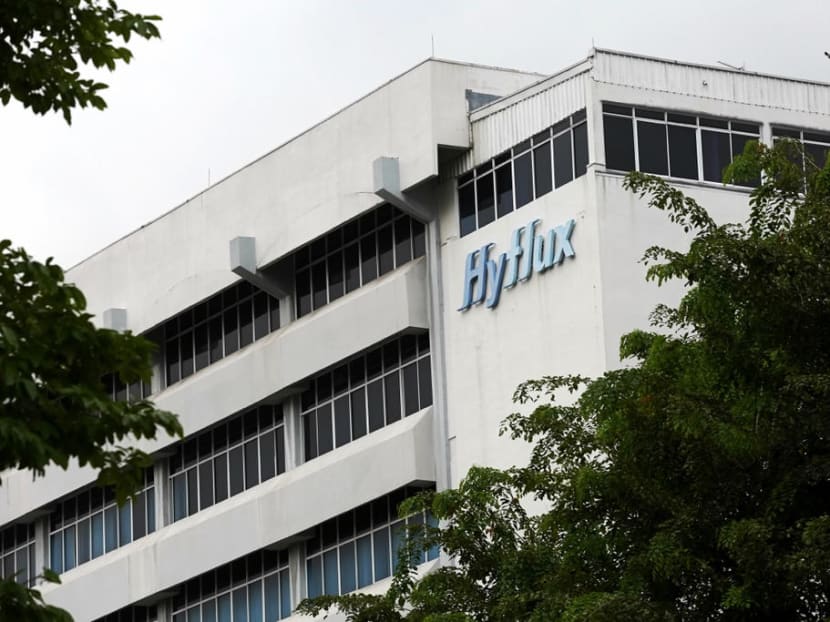Hyflux suspends Iran contracts after US reinstates sanctions
SINGAPORE — United States President Donald Trump has unwittingly dragged beleaguered water technology firm Hyflux deeper into the mire, after the Americans decided last month to reinstate sanctions on Iran.

The suspension of the contract is “expected to have a material adverse effect on the financial performance” of the company, Hyflux said.
SINGAPORE — United States President Donald Trump has unwittingly dragged beleaguered water technology firm Hyflux deeper into the mire, after the Americans decided last month to reinstate sanctions on Iran.
Just eight months after Hyflux was awarded a contract to build a seawater reverse osmosis desalination package in Bandar Abbas, Iran, it announced on Friday (Dec 14) that the deal has been suspended.
It also did not formalise a second contract for another desalination unit on the same site.
With the US reinstating another round of sanctions on Iran since Nov 5, Hyflux said it was unable to “maintain requisite banking support to receive payment” from Asia Water Development Engineering Company (AWDEC), the Iranian firm which awarded Hyflux the first and second contracts.
Hyflux added that the suspension of the first contract is “expected to have a material adverse effect” on its financial performance.
TODAY has reached out to Hyflux for more information on its expected losses.
The freezing of the contracts comes amid a court-supervised debt restructuring process which started in May, with Hyflux having chalked up debts of S$2.95 billion as of March 31.
It received a S$530 million lifeline in October after an Indonesian consortium, SM Investments, said it would acquire 60 per cent of Hyflux for S$400 million and grant a shareholder’s loan of S$130 million.
This is not the first time that Hyflux projects in the Middle East have come to a halt. In May this year, Hyflux pulled out of a project in Saudi Arabia to develop three desalination plants as a result of its debt woes.
In its media statement, Hyflux said it formally notified AWDEC on Dec 11 of its decision to suspend the contract with effect from Oct 16.
AWDEC was set up in 2011 to build and run the proposed Saghi Kosar (SAKO) Desalination and Power Plant in Bandar Abbas, which will feature five desalination plants producing one million cubic metres of water per day, as well as a 300 to 400 megawatt power plant.
The SAKO project was meant to address the growing domestic water scarcity in Iran and serve industries in the South-east of the country.
In April this year, Hyflux announced that it had won the first contract worth S$110 million, with the project expected to supply 200,000 cubic metres of water per day. Three months later, the water treatment firm said it was due to be awarded the second contract as AWDEC was pleased with the progress of the first plant.
Under president Trump, the US has been progressively reinstating sanctions on Iran that were lifted under the Joint Comprehensive Plan of Action — more commonly known as the 2015 nuclear deal — brokered by his predecessor Barack Obama.
In August, it reinstated its first round of sanctions by slapping barriers on trade involving Iranian metals, as well as its automotive and airline industries.
Three months later, additional reinstatements hit Iran’s oil, banking, shipping and energy sectors.
Mr Alex Capri, Senior Visiting Fellow of National University of Singapore’s Business School, said Hyflux’s suspension of its contracts in Iran is a “perfect example” of how companies in other countries become “collateral damage” due to the adversarial relationship between the US and Iran.
He said: “The overwhelming power of American sanctions is because the US dollar is king. The entire global financial system is built to facilitate the US dollar first and foremost.”
Given that “every single” US dollar circulating in the international system would be accounted for by the US central bank — the Federal Reserve — banks would be “under pressure” not to provide funding for business deals involving Iran.
“The Fed would know which bank it went through and who is tied to that transaction. They would be punished... (by being) shut out of the international banking system. The bank (Hyflux uses) doesn’t want to jeopardise its relationship to trade and the US dollar,” he added.








